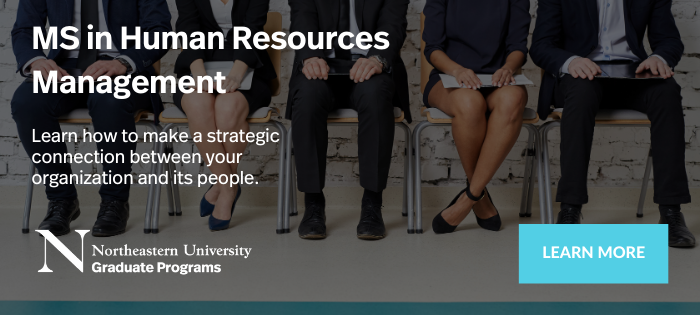The field of human resources (HR) has changed tremendously over the past decade. It’s evolved from an important business support function to a core capability in organizations. As a result, the most in-demand skills among these professionals have evolved.
Today, HR leaders and teams are expected to be partners in the business, says Carl Zangerl, faculty director for Northeastern University’s master’s in human resources management program. “This means they have to step up and assume a more strategic role, which has implications for the key skills they need to have.”
Here’s a closer look at the top must-have skills that HR professionals need to stay competitive in today’s job market.
Essential Skills for HR Professionals
1. Analytics
Technologies have had a transformational impact on the field of human resources. As a result, understanding how to manage, interpret, and make better decisions from data has become an essential skill.
HR professionals use data and analytics in a number of strategic capacities. During recruitment and hiring processes, data can help determine which person might best fit a role and the workplace culture. In other scenarios, these skills can also be used to better understand the performance and efficiency of the organization or to gauge the employee experience at a company—two factors that can then be used to inform HR professionals of potential areas of improvement in the company.
In talent acquisition, for example, an HR professional may use LinkedIn to better understand job needs, candidate demographics, and skill sets. According to Zangerl, LinkedIn’s database is incredibly powerful and useful in targeting candidates and making better hiring decisions—so long as you know how to use it.
“So many of the apps and software we use are generating huge quantities of data. The question now is what to do with that stuff,” he says. “How do we understand trends and patterns that will help us make better decisions? That’s why understanding data collection and analysis is such a key skill right now.”
Interested in becoming a strategic business partner in your organization?
Learn more about earning an advanced degree in Human Resources Management
2. Strategic Workforce Planning
Strategic workforce planning is the process of proactively anticipating current and future hiring needs to ensure that your organization has the resources needed to meet its goals. To excel in strategic workforce planning, HR professionals need to be strategic thinkers, Zanger says.
“Strategic workforce planning starts with understanding the drivers of your business, what’s driving performance results, and then understanding how your people-assets support those drivers,” he says.
For example, if a company plans to expand into three new geographic markets, HR professionals need to understand the recruiting, training, onboarding, development, and talent management implications of doing so. “In other words, they need to understand the big picture of the organization you’re working for and understand how people-assets support the organization’s strategy,” Zanger adds.
3. Organizational Design
Organizational design is the process of aligning the structure of an organization with its objectives—with the ultimate goal of improving efficiency and effectiveness.
“You need to understand the best way of organizing and structuring the organization,” Zangerl says. “It can be organized hierarchically or matrixyl, you can outsource jobs and tap into the gig economy, [etc.] It’s about deciding what functions within an organization you want to manage internally and what you want to outsource—then figuring out how to design the organization.”
This is an even more critical skill today, he adds. When the pandemic hit, for example, organizations suddenly had to consider the implications of employees working from home or working from the office irregularly, and how to organize people effectively.
4. Business Acumen
Because HR is a core business function today, professionals must know how to understand and apply information to contribute to the organization’s strategic plan. In other words, they need to know the business.
This requires advanced knowledge of the industry and the competitive environment in which an organization operates. HR professionals should be able to make the business case for HR management as it relates to efficient and effective organizational functioning, as well as understand the organizational metrics and their correlation to business success.
5. Digital literacy
As organizations continue to digitally transform, HR professionals must consider how technology can help the organization reach its goals. Digital literacy refers to the ability to discover and evaluate information through various digital platforms.
“HR professionals must be comfortable adopting digital methods and channels to do things that were once done manually,” Zangerl says. “Going back to the LinkedIn database example, you need to be digitally literate to leverage that information effectively.”
6. People Management
The field of HR has always centered around people management, Zangerl says. However, this skill is more encompassing than the name sounds: It’s about knowing how to motivate, engage, and manage the expectations of employees while linking them into the goals and strategies of the organization.
“[People management] involves an understanding of who your people are, their skill sets, and what they bring to the table,” he says. “It also requires a good understanding of culture—how it’s fundamentally important to the way people feel about where they work.”
HR professionals need to be attuned to employees’ health and well-being, and to how they view their work-life balance, as well. They also need to have excellent listening skills and empathy, and understand how to receive and use feedback from employees effectively.
Developing Your Skills
Developing these in-demand skills happens through a combination of work experience, observation, and often formal education.
Northeastern University’s master’s in human resources management program is designed to enhance students’ understanding and experience in HR management, and prepare them to advance in the field. It focuses on emerging HR competencies and skills, and offers six concentrations that align with the latest trends in HR. These include digital HR, artificial intelligence for HR, global talent management, project management, leadership, and organizational communication.
“One key element of our program is our faculty,” Zangerl says. “We have people who are actually in the field of HR who not only understand the specialties within recruiting and compensation but have a very strategic focus on HR.”
Not only do students learn from world-class faculty, but they also have the opportunity to gain hands-on experience directly in the field through experiential learning.
Earning a master’s in human resources management is a strategic choice that helps professionals hone the key skills necessary for excelling in the HR field. If you are considering advancing your career, a top school like Northeastern can help.
Learn how a master’s in human resources management at Northeastern can prepare you to advance your career today.








Related Articles
Master’s in Project Management or an MBA: What’s the Difference?
6 Project Management Trends Emerging in 2023
Master’s Degree Comparison: Sports Leadership vs. Sports Management